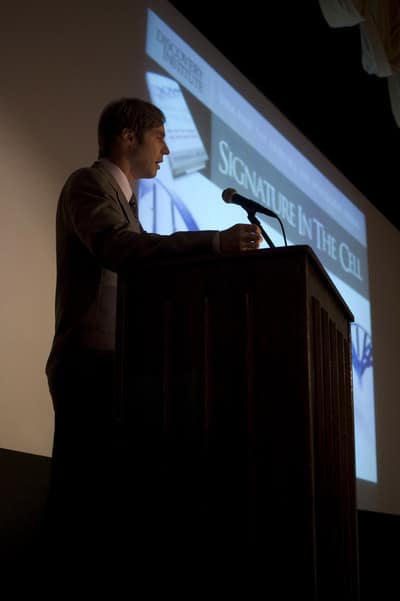Richard Dawkins’s Jewish Problem
The Anti-Defamation League, the country’s leading group dedicated to fighting anti-Semitism, is rightly sensitive to the offense of trivializing the Holocaust. Why, then, has the ADL said nothing in protest against the Darwinian biologist and bestselling atheist author Richard Dawkins and his comparison of Darwin doubters to Holocaust deniers?
The ADL has objected to attempts to inject Nazi imagery into the health-care reform debate (“Such statements only serve to diminish and trivialize the extent of the Nazi regime’s crimes against humanity”), the abortion debate (“Such analogies can only trivialize and diminish the horror”), the animal-rights debate (“the issue should stand on its own merits, rather than rely on inappropriate comparisons that only serve to trivialize the suffering of the six million Jews”), and in many other contexts.
But if Rush Limbaugh, for example, used “outrageous, deeply offensive and inappropriate” Nazi comparisons to stigmatize sponsors and supporters of health-care reform, why is it no less outrageous to compare people (like the late Irving Kristol, for example) who doubt Darwinian evolution to the moral cretins who deny the Holocaust? In his new book, currently the #22 best seller on Amazon, The Greatest Show On Earth: The Evidence for Evolution, Dawkins calls Darwin critics “history-deniers” and dwells on the comparison, even remarking that “The evidence for evolution is at least as strong as the evidence for the Holocaust, even allowing for eye witnesses to the Holocaust.”
Is that some sort of cruel joke? The evidence for Darwin’s account of evolution and, more so, its controversial mechanism of natural selection is a matter of inference, no matter how strong you think the inference is. The evidence for the Holocaust includes countless eye-witness accounts — a very different and superior order of evidence.
“People who reject the theory of evolution should be placed on a level with Holocaust deniers, argues an author in his controversial new book,” headlined the London Times when the book came out there last month. Yet not a peep from the ADL.
In his last book, The God Delusion, Dawkins used incredibly offensive language in characterizing the God of the Hebrew Bible, whom he called among other things, “a petty, unjust, unforgiving control-freak; a vindictive, bloodthirsty ethnic cleanser; a misogynistic, homophobic, racist, infanticidal, genocidal, filicidal, pestilential, megalomaniacal, sadomasochistic, capriciously malevolent bully.”
Now in a Newsweek interview he repeats the insult, saying: “The God of the Old Testament is a monster. It’s very, very hard for anybody to deny that. He’s like a hyped-up Ayatollah Khomeini.” Asked by Newsweek‘s Lisa Miller where this leaves the “90 percent of Americans [who] say they believe in God” and of whom “some portion…are intelligent people,” Dawkins replies, “But they wouldn’t disagree with what I said about the God of the Old Testament. They’d probably say something like, ‘Oh, that’s quite different. We believe in the God of the New Testament.'”
This places Jews among the portion of believing Americans who would have to be characterized as unintelligent. Miller calls Dawkins on this. He then says of Jews: “Well, sure enough. They’d say, ‘OK, we’ve moved on since that time.’ Thank goodness they have.”
Read More ›






































